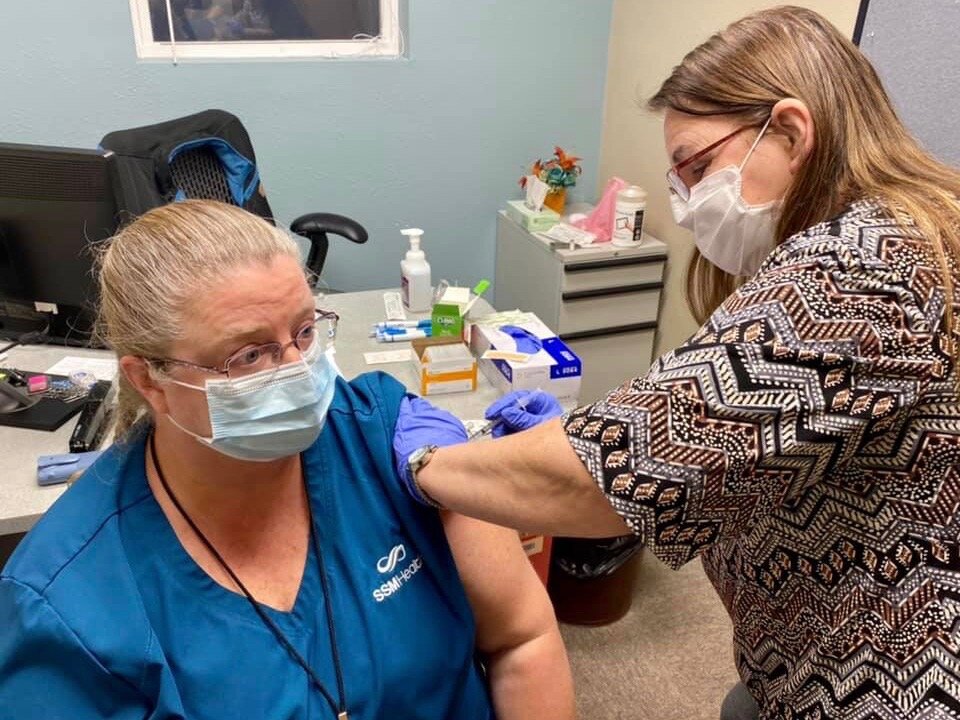Ill. leads U.S. with 100K COVID vaccinations
Pritzker praises process on Pfizer shot, awaits reinforcements from Moderna vaccine
A health-care worker gets vaccinated for COVID-19 last week at SSM Health in Mount Vernon. (Facebook)
By Ted Cox
Illinois leads the nation in vaccinations for COVID-19, according to the governor, having already surpassed 100,000 statewide.
Gov. Pritzker could barely contain his pride at the daily coronavirus briefing Wednesday over the 100,991 vaccinations that have been administered already to health-care workers across the state. Pointing out that is “more than any other state in the nation thus far,” including more populated states like California and Texas, he said, “The vaccine team in Illinois sprinted past them all in the first week.”
Pritzker estimated there are about 700,000 health-care workers across the state set to get vaccinated in the very first phase of the process, along with about 110,000 residents in nursing homes, plus staff. Once they’re inoculated, the state will move on to what’s being called Phase 1B, focusing on police officers, firefighters, and those over 75, with details to follow, but the governor was clearly pleased with the launch of the Pfizer vaccine.
The governor cited U.S. Food and Drug Administration approval for the additional Moderna vaccine and said he expects another 175,000 of those shots to be delivered to the state this week along with almost 50,000 for Chicago. He warned that both require two doses, weeks apart, and that people should receive both of the same vaccine, not jump from one to the other. The initial count of 100,000 vaccinations included shots administered by Chicago.
Pritzker and Public Health Director Dr. Ngozi Ezike continued to advise state residents to observe mitigation measures to contain the spread of the coronavirus. Ezike reported 6,762 newly confirmed cases of COVID-19 statewide on Wednesday, to bring the Illinois total to 918,070, while 135 new deaths attributed to COVID-19 took the state toll to 15,547. The deaths remained high, even as hospitalizations remained well below 5,000. The seven-day testing positivity rate stood at 7.5 percent.
“We are truly at the beginning of the end,” Ezike said in advising Illinoisans not to meet friends and families outside their households over the end-of-year holidays, or if so to take precautions like the three W’s: wear a mask, wash hands, watch social distancing. “We can’t let people who’ve made it this far not make it to the finish line.”
Pritzker rejected the idea of easing mitigation restrictions just with the small progress shown. He said health officials would be monitoring statistics for a potential rise in infections in the weeks after the holidays, and that he didn’t want to “yo-yo back and forth” on easing and reimposing restrictions.
Pritzker said the latest COVID-19 relief funding approved by Congress includes $10 billion in child-care support, and the funding due to come to the state would be used to firm up day care statewide through the Child Care Assistance Program, which will “cover all eligible days of CCAP payments for December, January, and February regardless of attendance,” according to a news release from the Governor’s Office. Pritzker estimated it would cover almost 100,000 kids statewide.
“Our lives are full of so many unknowns right now — and our child-care services know that all too well,” Pritzker said. “From staff calling in sick or staying home to take care of their own families, to concerns about community transmission, to families pulling their kids out of care — these tumultuous times have rained down in multiple ways upon our early childhood network of providers. I wanted to make it easier for them, so we can make sure child care is available to parents who need it.”
“As we head into the winter months, this funding will help businesses across the state survive what continues to be a very tough road during the COVID-19 pandemic,” said Grace Hou, secretary of the Illinois Department of Human Services, in an accompanying statement. “The members of our child-care network are essential workers, and this is a positive step towards economic recovery.”
“This is so important for us to be able to support and advocate for children of the communities we serve,” added Maricela Garcia, CEO at Gads Hill Center, with locations in Chicago. “These changes give us the flexibility to run our programs during very challenging times for so many. These policies are a chance to take away penalties that organizations would be facing in the wake of COVID-19 and also relieves parents from a burden as so many have had to adjust their schedules and make the necessary changes to keep their families healthy.
"It's evident that families are watching the positivity rates, and we have seen attendance really fluctuate to keep safety as the priority,” Garca said, “but we are looking forward to keep serving the children we care for every day.”

